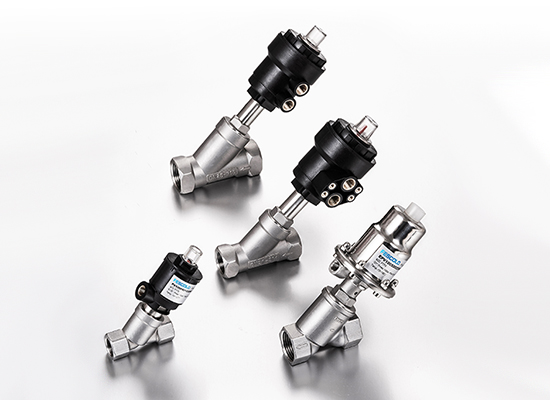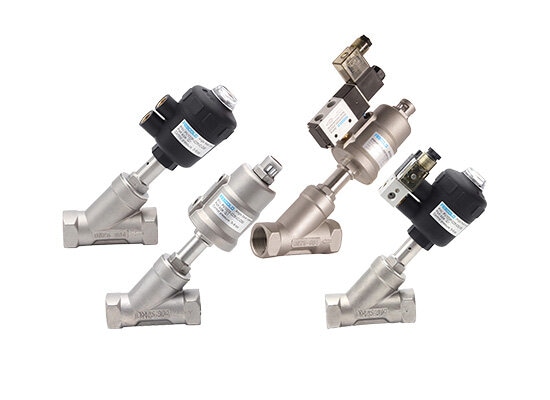
The angle seat valve is a special type of valve widely used in fluid, gas, and steam control systems. Unlike traditional valve designs, the inlet and outlet of an angle seat valve are usually positioned at a 90-degree angle. This design makes it more efficient in controlling flow, making it suitable for various industrial environments.
Angle seat valves have a very high flow capacity, making them ideal for high-flow liquid, gas, or steam transmission.
The unique angle design reduces flow resistance, enabling higher flow rates at lower pressures.
Angle seat valves are typically equipped with high-performance sealing elements, ensuring reliable sealing even under extreme working conditions.
This makes them highly popular in applications where sealing performance is critical.
Angle seat valves can be configured with either an automated control system or manual operation.
The automated versions use electric or pneumatic actuators to achieve precise flow control, making them suitable for applications that require real-time flow adjustments.
To meet the demands of different working environments, angle seat valves are usually made of materials that are resistant to high temperatures and corrosion.
This enables them to work reliably over long periods in industries such as chemicals, food processing, and steam.

Angle seat valves are often used for controlling the flow of liquids, particularly in high-flow systems that require precise flow regulation.
For example, they are commonly used in water treatment, pharmaceuticals, and food processing industries to ensure precise fluid flow and regulation.
In gas systems, angle seat valves are used for controlling gases such as compressed air and natural gas, thanks to their low-pressure loss and high-flow capacity.
These valves are essential in pneumatic control systems, gas transmission, and automated equipment.
Angle seat valves are widely used in steam systems, especially in steam boilers and steam heating systems.
Their high-temperature resistance and excellent sealing capabilities allow them to effectively control steam flow and pressure, ensuring system stability and safety.
◆ MV200 Series T Type Manual Right Globe Control Valve
◆ PV32s series Economical Style Angle Seat Valve
◆ TV300 Series Pneumatically Operated 3-way seat Valve
◆ PV800 Series Angle Seat Valve(Piston Valve)
...
When selecting an angle seat valve, several key factors should be considered to ensure optimal functionality and performance:
The type of medium being controlled, including liquid, gas, or steam, must be clarified first. Different media have different material requirements, especially regarding corrosion resistance and high-temperature resistance.
Choosing a valve suited for a specific medium can extend its service life and improve operational efficiency.
The flow capacity of an angle seat valve is closely related to its size. It is important to select the right model based on system flow requirements and working pressure.
For higher pressures, a high-pressure angle seat valve is recommended, while systems requiring larger flow rates may require larger valve sizes.
The choice between an automated or manual angle seat valve should be based on application needs. Automated valves allow for precise flow regulation through control systems, making them ideal for automated production lines and remote control applications. Manual valves are suitable for systems where frequent flow adjustments are not necessary.
Different operating environments require different valve body materials. For high-temperature, high-pressure, or corrosive media applications, materials such as stainless steel or alloys should be selected to ensure the angle seat valve performs reliably under harsh conditions.
The sealing performance of an angle seat valve is a critical factor influencing its efficiency and lifespan. Selecting the appropriate sealing material for the working environment ensures the valve will not leak over time, maintaining system efficiency.
Due to their 90-degree angle design, angle seat valves allow higher flow rates with lower pressure drops compared to ball valves, which can be restrictive at high flow rates.
Angle seat valves generally provide more reliable sealing, especially in high-pressure or high-temperature applications, whereas ball valves may experience leakage over time due to wear.
Angle seat valves are built with materials that can withstand high temperatures and aggressive media, offering more durability than solenoid valves, which may struggle in extreme environments.
With pneumatic or electric actuation, angle seat valves offer more precise flow control, unlike solenoid valves that are typically on/off.
Angle seat valves typically require less frequent maintenance compared to ball valves in systems with continuous flow and pressure fluctuations.
A pneumatic angle seat valve operates by using compressed air to actuate a piston or diaphragm, which moves the valve stem.
This movement opens or closes the valve, regulating the flow of fluids, gases, or steam.
When air pressure is applied to one side of the actuator, the valve opens, and when pressure is applied to the other side, the valve closes.
This allows for precise control of flow, making it suitable for automated systems requiring quick and accurate adjustments.
Fokca is a professional supplier, and for any detailed issues, you can consult our sales for assistance.
FOKCA ©1998-2025 All Rights Reserved Sitemap